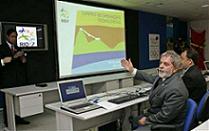Brazil's Lula blasts rich nations on climate
 Brazilian President Luiz Inacio Lula da Silva blamed wealthy countries for global warming on Tuesday and said they should stop telling Brazil what to do with the Amazon rainforest.
Brazilian President Luiz Inacio Lula da Silva blamed wealthy countries for global warming on Tuesday and said they should stop telling Brazil what to do with the Amazon rainforest.
"The wealthy countries are very smart, approving protocols, holding big speeches on the need to avoid deforestation but they already deforested everything," Lula said during the announcement of a public works project in Rio de Janeiro.
Lula, a former factory worker, said wealthy countries should switch to non-fossil fuels, such as ethanol or biodiesel -- an area where Brazil is a pioneer.
"We need a different campaign, not only to protect plants and animals ... to get rich countries to reduce gas emissions," he said.
Environment ministers from nearly 100 nations are meeting in Nairobi, Kenya, to discuss recent scientific findings that the burning of fossil fuels is likely to raise sea levels, cause more storms and shrink tropical forests like the Amazon.
China also blamed rich nations earlier on Tuesday for greenhouse gases that fueled global warming and urged them to cut emissions.
Brazil is the world's largest producer of ethanol, which is derived from sugar cane. It will invest 17.4 billion reais ($8.3 billion) in renewable fuels over the next four years.
Accelerating demand for fuel ethanol has encouraged investors to move into traditional coffee growing areas in Minas Gerais state in search of more land to plant sugar cane.
"No country is revolutionizing its energy matrix as we are," Lula said. "The so-called carbon credits they invented -- so far, we haven't seen a cent of that," he added in reference to compensation for preserving carbon-absorbing forests.
The U.S. government has refused to sign the Kyoto Protocol, which sets ambitious targets for the reduction of greenhouse gases. The United States is responsible for one-quarter of the world's emissions of carbon dioxide.
Brazil has repeatedly rejected proposals for international control over the Amazon rainforest, the world's largest source of fresh water and biodiversity.
Lula said Brazil had reduced deforestation in the Amazon by 52 percent over the past three years. "There are few countries in the world that have the moral authority to talk about deforestation with Brazil," Lula said.
Many analysts say a cyclical downturn in agriculture, not government policies, has slowed deforestation in the Amazon region. Still, an area the size of the U.S. state of Connecticut is destroyed every year in the Amazon as loggers cut timber and farmers follow them to plant soybeans or rice.
(Published by Reuters, February 7, 2007)